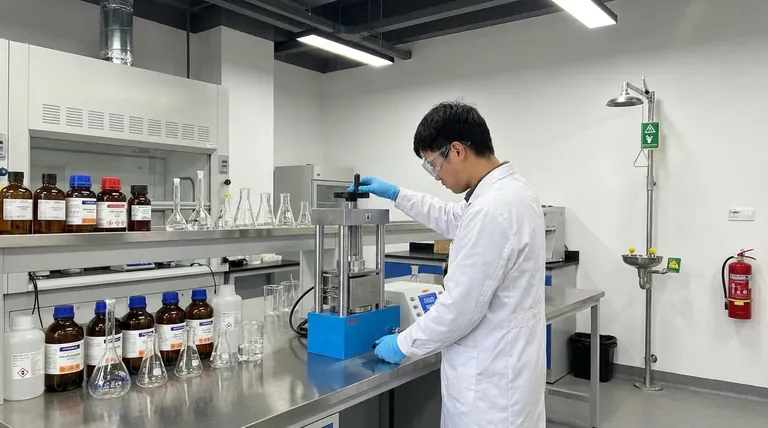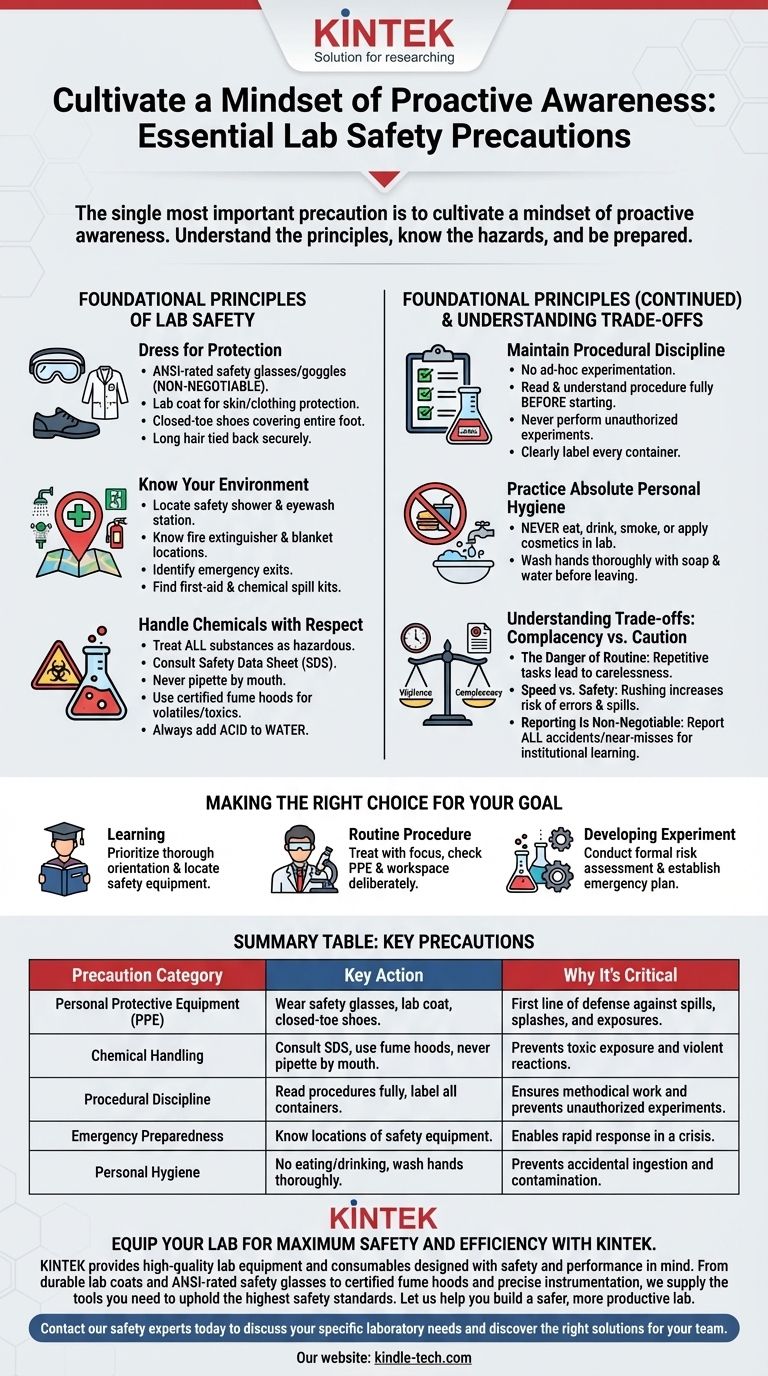The single most important precaution in any lab is to cultivate a mindset of proactive awareness. This involves not just following a list of rules, but understanding the principles behind them. Before any action, you must know the specific hazards of the materials you are handling, be prepared for potential emergencies, and have the discipline to use all required safety equipment without fail.
True laboratory safety is not a checklist to be completed, but a continuous practice. It's built on a foundation of respecting the materials, knowing your environment, and never allowing familiarity to breed complacency.

Foundational Principles of Lab Safety
Effective safety protocols are built on a few core pillars. Understanding the reasoning behind each one is critical for developing the right instincts when working in a potentially hazardous environment.
Dress for Protection, Not for Show
Your clothing and personal protective equipment (PPE) are your first line of defense against spills, splashes, and other unexpected exposures.
The non-negotiable standard is ANSI-rated safety glasses or goggles, which must be worn at all times.
You must also wear a lab coat to protect your skin and clothing, along with closed-toe shoes that cover the entire foot. Long hair must be tied back securely.
Know Your Environment
In an emergency, you will not have time to look for safety equipment. A critical part of your preparation is knowing the exact location and operation of key safety features before you ever begin an experiment.
This includes the safety shower, eyewash station, fire extinguisher, fire blanket, and all emergency exits. You should also be familiar with the location of the first-aid and chemical spill kits.
Handle All Chemicals with Respect
Treat every substance in the lab, even those that seem harmless, as potentially hazardous. This disciplined approach prevents accidents.
Always consult the Safety Data Sheet (SDS) for any chemical you are unfamiliar with to understand its specific risks and handling requirements.
Never pipette by mouth. When working with volatile or toxic substances, perform the work inside a certified fume hood. Crucially, always add acid to water, never the other way around, to prevent a violent exothermic reaction.
Maintain Procedural Discipline
Ad-hoc experimentation is a primary cause of lab accidents. A structured, methodical approach is essential for safety and for the integrity of your results.
Read and fully understand every step of a procedure before you begin. Never perform unauthorized experiments.
Ensure every container is clearly and accurately labeled. An unlabeled beaker is a dangerous variable that has no place in a professional lab.
Practice Absolute Personal Hygiene
The laboratory is not a place for personal activities. The barrier between your work and your personal life must be strictly maintained to prevent accidental ingestion or contamination.
Never eat, drink, smoke, or apply cosmetics inside the lab.
Wash your hands thoroughly with soap and water before leaving the lab, even if you were wearing gloves. This removes any trace contaminants you may have come into contact with.
Understanding the Trade-offs: Complacency vs. Caution
The greatest long-term threat to lab safety isn't a single, dramatic event; it's the slow erosion of vigilance. Understanding the psychological pitfalls is as important as knowing the rules.
The Danger of Routine
Repetitive tasks can lull you into a false sense of security. It is precisely when you feel most comfortable that you are most likely to skip a step, forget to put on your goggles, or become careless.
Speed vs. Safety
There is often pressure to produce results quickly. However, rushing a procedure is a direct trade-off against safety. A hurried process dramatically increases the risk of spills, broken glassware, and critical errors.
Reporting Is Non-Negotiable
Some people avoid reporting minor incidents out of fear or embarrassment. This is a critical mistake. Reporting all accidents, spills, and near-misses is essential for institutional learning and preventing a more serious event from happening in the future.
Making the Right Choice for Your Goal
Your approach to safety should be tailored to your specific context and experience level.
- If your primary focus is learning in a new lab: Prioritize a thorough orientation. Physically locate all safety equipment and review the specific SDS for every chemical you will handle before you begin.
- If your primary focus is performing a routine procedure: Treat it with the same focus as the first time. Deliberately check your PPE and workspace before you start to counteract the risk of complacency.
- If your primary focus is developing a new experiment: Conduct a formal risk assessment. Identify every potential hazard and establish a clear mitigation and emergency response plan before mixing the first chemical.
Ultimately, a safe laboratory is the direct result of the conscious, deliberate actions taken by every individual who works within it.
Summary Table:
| Precaution Category | Key Action | Why It's Critical |
|---|---|---|
| Personal Protective Equipment (PPE) | Wear ANSI-rated safety glasses, lab coat, closed-toe shoes. | First line of defense against spills, splashes, and exposures. |
| Chemical Handling | Consult SDS, use fume hoods, never pipette by mouth. | Prevents toxic exposure and violent reactions. |
| Procedural Discipline | Read procedures fully before starting, label all containers. | Ensures methodical work and prevents unauthorized experiments. |
| Emergency Preparedness | Know locations of safety showers, eyewash stations, fire extinguishers. | Enables rapid response in a crisis. |
| Personal Hygiene | No eating/drinking, wash hands thoroughly after work. | Prevents accidental ingestion and contamination. |
Equip your lab for maximum safety and efficiency with KINTEK.
Creating a safe laboratory environment requires not just knowledge but also the right, reliable equipment. KINTEK specializes in providing high-quality lab equipment and consumables that are designed with safety and performance in mind. From durable lab coats and ANSI-rated safety glasses to certified fume hoods and precise instrumentation, we supply the tools you need to uphold the highest safety standards.
Let us help you build a safer, more productive lab. Contact our safety experts today to discuss your specific laboratory needs and discover the right solutions for your team.
Visual Guide

Related Products
- Manual Lab Heat Press
- Portable High Pressure Laboratory Autoclave Steam Sterilizer for Lab Use
- 30T 40T Split Automatic Heated Hydraulic Press Machine with Heated Plates for Laboratory Hot Press
- Heated Hydraulic Press Machine with Heated Plates Split Manual Laboratory Hot Press
- Heated Hydraulic Press Machine with Integrated Manual Heated Plates for Lab Use
People Also Ask
- What are the parts of a manual hydraulic press? A Guide to Its Core Components and Operation
- What does a manual press do? Understand the Two Key Types for Your Lab or Industrial Needs
- What is the construction of a hydraulic press based on? Unlocking the Power of Pascal's Law
- What is a hydraulic press in simple words? Harness Immense Force for Shaping and Crushing
- What are the potential hazards in a hydraulic press? Understanding the Risks of Crushing, Injection, and Failure











